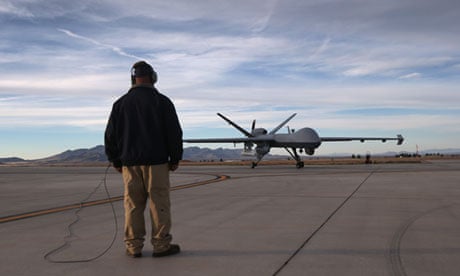President Obama is expected to discuss the use of drone strikes today in a speech on national security. For those who read this website, the use of unmanned aerial vehicles to take out suspected terrorists is a hot topic, but what exactly do Americans think of the practice? Frankly, most don't seem to care. Those that do have an opinion approve, in principle.
Following Senator Rand Paul's filibuster aimed at shining light on the drone program, interest in the media peaked. Yet most Americans yawned – only 14% in a Gallup poll said they were following the news very closely, and 35% said they were following the news somewhat closely. Combined, the percentage of Americans following news stories about drones "closely" was below 50% (and equal to the percentage who were not following the news closely). The percentage following closely was over 10pts lower than the average percentage who follow a "big news story" closely.
You might expect that the percentage of Americans following the drone news would largely oppose the use of drones, but you'd be wrong. Fifty-nine percent of Republicans, who are most likely to support drone strikes, were following drone news at least somewhat closely, compare with only 45% of Democrats following the story. That's in line with other data that suggests Republicans generally follow news more closely when it could possibly trouble the Obama administration. Either way, most Americans against drone strikes don't seem to care much about it.
Indeed, most Americans at least partially favor drone strikes. Although differences in the wording of questions reveals different results, the median result falls along the lines of an April CBS News report, which found that 70% favored "the US using unmanned aircraft or 'drones' to carry out bombing attacks against suspected terrorists in foreign countries".
Even the least favorable response, a Pew poll in February, found majority support for the the use of drones: 56% favoured, while only 26% opposed "conducting missile strikes from pilotless aircraft called drones to target extremists in countries such as Pakistan, Yemen and Somalia".
Support for the drone program varies across demographic and political groups about like you'd expect. Across pretty much all polling, Republicans, by about 10pts, are more likely to support drone use in general than Democrats, though majorities of both parties support it. Men are more likely to favor it than women, by anywhere from 7pts to 20pts. Again, however, more women favor the drone program in general than oppose it.
Why are Democrats and women more likely to oppose drone usage? It's not because of the program's murky legality. Among both groups, only 35% or less are "very concerned" about legality. With regard to the drones, Americans' number one worry is that the program endangers civilian lives. It's the only concern that garners a majority among the American people and among either Democrats or women.
Of course, striking non-American citizens on foreign soil is only part of the picture. The polling is less conclusive when the pollster specifically mentions killing Americans citizens via drone attack. The aforementioned Gallup poll found that a tiny majority, 51%, were opposed to using drones to kill US citizens overseas, per the following question: "Do you think the US government should or should not use drones to launch airstrikes in other countries against US citizens living abroad who are suspected terrorists?"
A Fox News poll found a majority, 60%, approved of this question: "Do you approve or disapprove of the United States using unmanned aircraft called drones to kill a suspected terrorist in a foreign country if the suspect is a US citizen?"
What accounts for the difference? The Gallup poll was taken after Rand Paul's filibuster, so that could be part of it. However, CBS News showed no changed before or after Paul's polemic, and used consistent question wording. It's more likely that more proactive words, like "airstrikes" and "launch", might have raised the hackles of respondents and made a few more people oppose the program. As usual, truth probably lies between the surveys. A February CBS News poll discovered that 49%, a plurality, but not a majority, favored "the US targeting and killing American citizens in foreign countries who are suspected of carrying out terrorist activities against the US".
The one thing all the polling agrees is that Americans are opposed to using drones to kill Americans in the United States. According to both Fox and Gallup, the majority is against this practice. Wording, again, makes a difference on the exact percentages, but Americans are strongly against this fantastical scenario.
The fact remains, however, that on drones writ large, most Americans just don't seem to care, and aren't paying attention to the news. Those who are paying attention mostly favor the program, which fits with the overall public support of using drones to kill non-US citizens overseas. The polling is more split on killing citizens in other counties, but it seems that more American support than oppose the policy.
